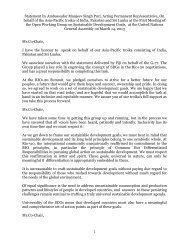STATE OF THE WORLD'S CITIES 2012/2013 Prosperity
STATE OF THE WORLD'S CITIES 2012/2013 Prosperity
STATE OF THE WORLD'S CITIES 2012/2013 Prosperity
You also want an ePaper? Increase the reach of your titles
YUMPU automatically turns print PDFs into web optimized ePapers that Google loves.
State of the World’s Cities <strong>2012</strong>/<strong>2013</strong><br />
SOME IMPEDIMENTS TO <strong>THE</strong> URBAN PROSPERITy<br />
Based on the UN-Habitat local expert survey, there are<br />
seven main impediments to urban prosperity, as follows:<br />
poor governance and weak institutions; corruption; lack<br />
of appropriate infrastructure; high incidence of slums and<br />
poverty; high costs of doing business; low levels of human<br />
capital; and high crime rates (Figure 3.1.2). The hard-won<br />
prosperity gains made by cities in terms of productivity,<br />
infrastructures, quality of life, equity, social inclusion and<br />
environmental sustainability can be jeopardized or eroded,<br />
either individually or collectively, by these impediments.<br />
Poor governance and weak institutions<br />
What this implies is that countries in Africa and Arab<br />
States must do more to improve urban governance and<br />
institutions. Indeed, in many developing countries, the<br />
institutions required for urban prosperity, if they exist, are<br />
weakly developed. Proper<br />
institutions are crucial<br />
Poor governance formal (Constitution,<br />
FACT and weak<br />
laws and regulations) and<br />
institutions act as major informal (social norms,<br />
impediments to higher<br />
customs and traditions)<br />
urban prosperity.<br />
rules that determine how<br />
people, organizations<br />
and firms make decisions<br />
POLICy<br />
The impact of<br />
poor governance<br />
and weak institutions on<br />
urban prosperity appears<br />
to be more pronounced in<br />
cities in Africa and Arabs<br />
States, where over 40 per<br />
cent of experts cite this<br />
factor as the single most<br />
important impediment.<br />
FACT<br />
Corruption is<br />
considered by local<br />
experts as the second most<br />
important hindrance to<br />
enhanced urban prosperity.<br />
FACT<br />
Corruption can<br />
be detrimental<br />
to urban prosperity in a<br />
variety of ways.<br />
of an economic, social<br />
political nature, maximize<br />
potentials and optimize<br />
resources. 25<br />
Sound institutions<br />
matter for the prosperity<br />
of cities, as they provide<br />
the superstructure that<br />
enables, or otherwise,<br />
underlying factors to<br />
operate and deliver a<br />
maximum of benefits<br />
to the largest possible<br />
majority of the population.<br />
Institutional inadequacies<br />
take the form of weak (if<br />
not altogether lacking)<br />
legal and institutional<br />
frameworks26 , disregard<br />
for the rule of law,<br />
poor enforcement of<br />
property rights, excessive<br />
98<br />
bureaucracy, and proliferation of corrupt practices among<br />
others. All these are incompatible with urban prosperity.<br />
Corruption<br />
Local experts surveyed by UN-Habitat unanimously concur<br />
that corruption is a major threat to the prosperity of cities.<br />
This is in line with the view that corruption is the single<br />
largest obstacle to development. 27 Corruption can be found<br />
operating on a grand scale, often penetrating the highest<br />
policy-making organs of government, including urban<br />
authorities, or take a petty sort of nature, involving everyday<br />
public and social interactions.<br />
Corruption acts a deterrent to direct (and even<br />
indirect) foreign investment, as it will influence foreign<br />
firms’ decisions to locate in a particular country or city.<br />
Corruption acts like a tax, only imposed for private instead<br />
of public benefit. 28 One of the reasons that foreign firms are<br />
attracted to cities such as Bridgetown (Barbados), Santiago<br />
(Chile), Gaborone (Botswana), Doha (Qatar), San Juan<br />
(Puerto Rico), St Louis (Mauritius), Kigali (Rwanda) or<br />
Victoria (Seychelles) is because they all located in countries<br />
with low levels of corruption.<br />
Corruption undermines the ability of city authorities to<br />
provide fair municipal services, as it distorts planning and<br />
allocation processes.<br />
Corruption is particularly evident in large-scale<br />
urban infrastructure projects, and distorts infrastructure<br />
spending in various ways. 29 It can increase public<br />
expenditure on new infrastructure, since such capital<br />
projects can be easily manipulated by politicians and highlevel<br />
officials to obtain bribes.<br />
Corruption can reduce the resources normally available<br />
to urban authorities for improved provision of basic services<br />
such as water, sanitation, education, health and recreation,<br />
which are all essential for urban prosperity and the<br />
achievement of the Millennium Development Goals, many<br />
of which are urban-related.<br />
Corruption can also result in shoddy delivery of urban<br />
services. When contractors offer bribes to secure contracts,<br />
they are likely to cut back and compromise on quality in<br />
order to recoup part or whole of the bribe offered.<br />
Inadequate infrastructure<br />
Cities with deficient infrastructure will be adversely affected<br />
on many fronts; they are less likely to be prosperous,<br />
sustainable or productive. For instance, inadequate water<br />
and sanitation facilities will lead to deterioration of the<br />
urban environment, increasing the disease burden of the



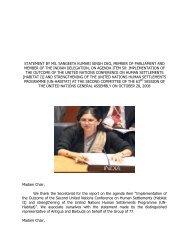
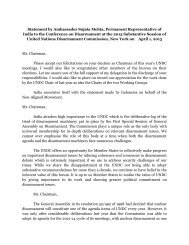
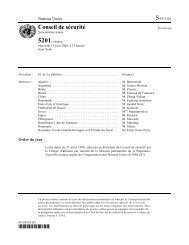
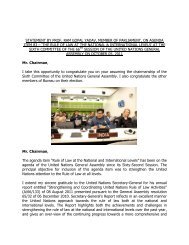
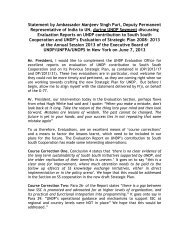

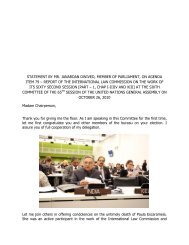
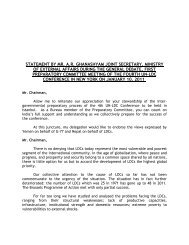
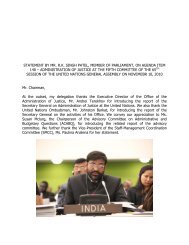
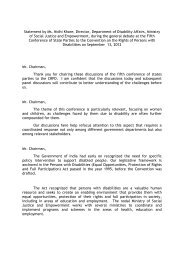
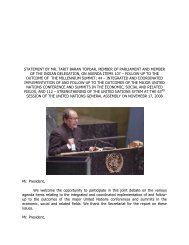
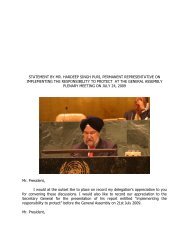
![1 statement by dr.[mrs] kakoli ghosh dastidar - Member States Portal](https://img.yumpu.com/27526598/1/190x245/1-statement-by-drmrs-kakoli-ghosh-dastidar-member-states-portal.jpg?quality=85)
